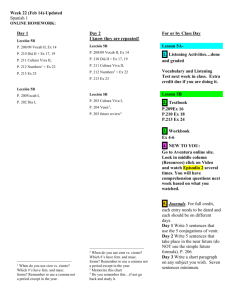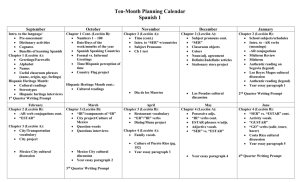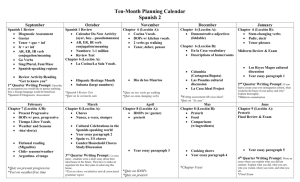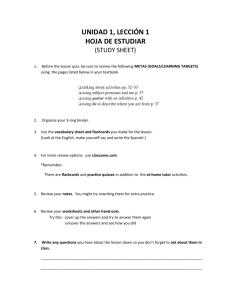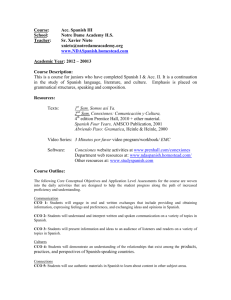Spanish 101 Spring 2016 Hybrid course syllabus
advertisement
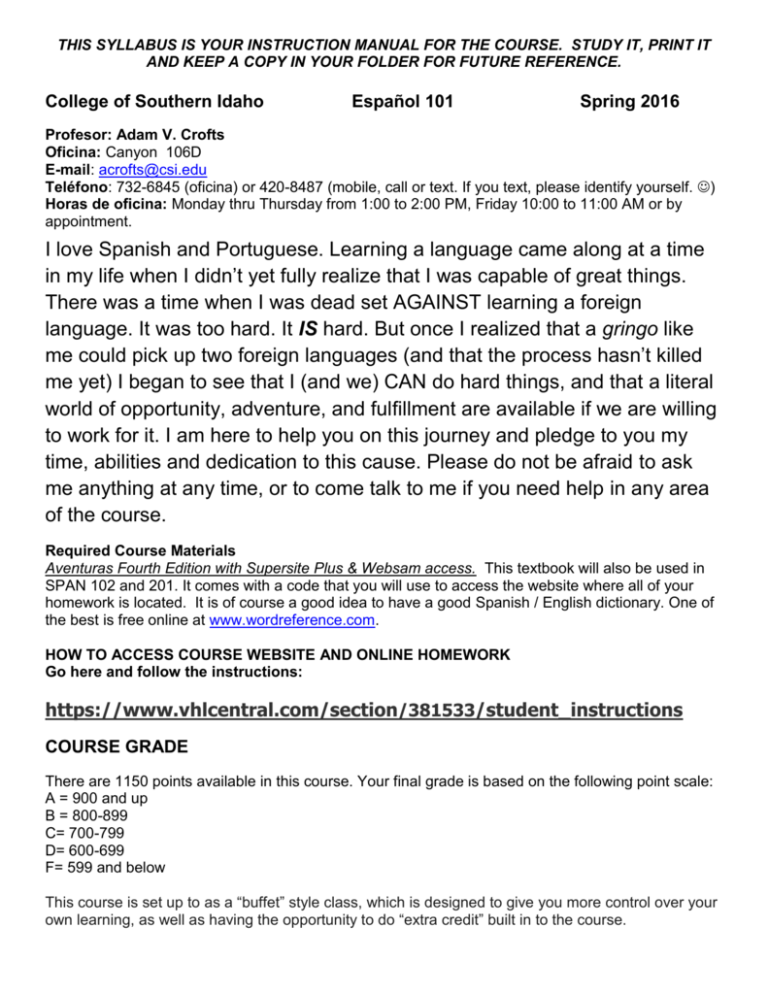
THIS SYLLABUS IS YOUR INSTRUCTION MANUAL FOR THE COURSE. STUDY IT, PRINT IT AND KEEP A COPY IN YOUR FOLDER FOR FUTURE REFERENCE. College of Southern Idaho Español 101 Spring 2016 Profesor: Adam V. Crofts Oficina: Canyon 106D E-mail: acrofts@csi.edu Teléfono: 732-6845 (oficina) or 420-8487 (mobile, call or text. If you text, please identify yourself. ) Horas de oficina: Monday thru Thursday from 1:00 to 2:00 PM, Friday 10:00 to 11:00 AM or by appointment. I love Spanish and Portuguese. Learning a language came along at a time in my life when I didn’t yet fully realize that I was capable of great things. There was a time when I was dead set AGAINST learning a foreign language. It was too hard. It IS hard. But once I realized that a gringo like me could pick up two foreign languages (and that the process hasn’t killed me yet) I began to see that I (and we) CAN do hard things, and that a literal world of opportunity, adventure, and fulfillment are available if we are willing to work for it. I am here to help you on this journey and pledge to you my time, abilities and dedication to this cause. Please do not be afraid to ask me anything at any time, or to come talk to me if you need help in any area of the course. Required Course Materials Aventuras Fourth Edition with Supersite Plus & Websam access. This textbook will also be used in SPAN 102 and 201. It comes with a code that you will use to access the website where all of your homework is located. It is of course a good idea to have a good Spanish / English dictionary. One of the best is free online at www.wordreference.com. HOW TO ACCESS COURSE WEBSITE AND ONLINE HOMEWORK Go here and follow the instructions: https://www.vhlcentral.com/section/381533/student_instructions COURSE GRADE There are 1150 points available in this course. Your final grade is based on the following point scale: A = 900 and up B = 800-899 C= 700-799 D= 600-699 F= 599 and below This course is set up to as a “buffet” style class, which is designed to give you more control over your own learning, as well as having the opportunity to do “extra credit” built in to the course. VHL Central homework assignments Quizzes PresentationsFinal Exam / Interview 450 points (6 chapters, 75 points each) 300 points (10 quizzes, 30 points each) 120 points (3 total, 40 points each) 130 points (100 points written / 30 points interview) ______________ = 1000 Points Spanish news article summaries Spanish song assignments “El Norte” film assignment- 15 points (each summary) 15 points (each assignment) 30 points ________________ = (up to) 150 points Possible Points - = 1150 points You may notice that the first four items (homework, quizzes, presentations and the final exam) are worth the majority of points in the class. In our “buffet” analogy, these are the main dish; the “meat and potatoes” if you will. These will give you the most nutrition and energy out of your dining experience. We can consider the other assignments as “desserts”: they are a tasty addition to your meal, as well as providing quick energy and extra calories, but should not be considered a substitute for the main course. The “Main course” assignments will be enough to fill you up (and get you an A), but the dessert bar is there if you should want (or need) it. Grades for chapter assignments and quizzes, as well as any “dessert” assignments will periodically be posted on the course grade book in Canvas. “MEAT & POTATOES” ASSIGNMENTS VHL Central All of your homework will be accessed through the Vista Supersite (vhlcentral.com). Most of the assignments are automatically corrected and you have as many attempts as you need to master the concepts (and get a perfect score) before the due date. A few assignments (those with true or false and open-ended questions) have only one attempt. Homework assignments are frequent (often daily) so you can get the practice you need to retain new material. You may work ahead and complete assignments before they are due. All late assignments will receive an automatic deduction of 10% per day that they are late. As technology is sometimes prone to hiccups depending on the browser or device that you are using, please make sure you give yourself plenty of time to complete all tasks before they are due. If you are in need of extra points for any reason, you will need to select from the “dessert” buffet assignment options to obtain them. Homework can be viewed and accessed through the assignment calendar on the website. Please check the calendar daily and be aware of assignment due dates! Do not feel bad if it takes you many attempts to finish an assignment. We learn through trial and error, and repetition is a huge part of the process. I recommend that you watch each chapter’s videos and grammar tutorials multiple times. If you are consistent and study every day, the homework will help you gain a strong foundation towards fluency in Spanish. Quizzes You will have a quiz nearly every Monday in class (with some exceptions). The quizzes cannot be made up if you miss class. Presentations You will have the opportunity to give a brief presentation in Spanish on an assigned topic (relating to and using the grammar and vocabulary we are studying at the time) on 3 different occasions during the semester. These will be given in class and will only be a few minutes each. On these days, student presentation order will be selected randomly. There will not be time to make up a missed presentation if you happen to be absent when you are selected. The grading criteria for presentations are shown in the rubric provided at the end of this syllabus. Outcomes Assessment Interview 1-2 weeks before the final exam, you will have a brief interview with a Spanish faculty member to determine your progress in listening comprehension and oral fluency. In addition to being part of your final exam grade, the results of this interview are also evaluated by Spanish faculty to determine if students, as well as the class in general, have made satisfactory progress in achieving the course objectives. Final Exam The final will be taken in our classroom on Monday, May 9, from 8:00 to 10:00 AM. “DESSERT” ASSIGNMENTS You can submit up to 2 extra credit assignments per chapter or up to 150 total points toward your course grade throughout the semester. In other words, you cannot turn in 12 dessert assignments the last week of the semester. Up to two extra-credit assignments, if you elect to do them, will be accepted on each the following days: February 8 February 22 March 7 March 28 April 11 May 2 “Dessert” assignment guidelines, Spanish 101 Dessert option #1: Spanish news article summary For this assignment, you will read and summarize a Spanish language news article of your choosing. You can find several up-to-date news sites from all over Latin America and Spain at www.prensaescrita.com, as well as www.dailyearth.com. While these two sites feature links to Spanish language newspapers, you can also find plenty of news relating to entertainment, music, gossip, celebrities, sports, etc. at www.univision.com, www.peopleenespanol.com, http://cnnespanol.cnn.com, and of course, the almighty Google. This article will be graded on (1) a summary of the article or news item selected, and (2) your reaction to and thoughts about what you have read. The summary portion can be in English (with some Spanish if you want to try it), but your thoughts and reaction must be in SPANISH. In selecting an article or news item to summarize, please keep the following in mind: 1) Try to choose something that interests you. If you like sports, look for news about the Chilean soccer team. If you like music, try to find a concert or album review. The point is to find something that will help you learn vocabulary that you will be likely to use when discussing your interests with others. 2) Don’t rely on a dictionary. As hard as this may sound, you will be able to understand more than you think buy using other clues before resorting to looking up every word. Excessive dictionary use is exhausting, painful, and doesn’t tend to help you retain new words. Instead, look first for (a) visual cues, (b) previous knowledge, and (c) cognates. a. Visual cues: Look at the pictures! They are worth a thousand words, especially in a language where you don’t know that many words yet. b. Previous knowledge: You will find that Spanish-language news will have many of the same events that are covered in the English language press. I am continually amazed at how often news from the US (even news that doesn’t seem at all relevant to Latin America) ends up in Latin American papers. c. Cognates: A cognate (cognado in Spanish) is a word that you can usually easily understand in a foreign language because it looks a lot like the English word and has the same meaning. Some examples are universidad, calendario, teléfono, computadora, atlético, etc. Spanish has thousands of words that have a cognate in English. This assignment is worth 15 points total, based on the following criteria: The summary is worth 7.5 points and will be graded according to length and content. I am not as concerned with the accuracy of your understanding as I am with the effort that you make to understand and learn. If your summary shows a decent interpretation of the content of the article based on your reading of cognates, visual cues, etc., then your grade will reflect that. It must be at least a paragraph. A paragraph is not just one sentence, but a group of sentences that contain a single idea. One-sentence responses will receive no points for the summary portion. The second paragraph (also worth 7.5 points) will be your reaction in Spanish to the content of the article. In Spanish 101, I do not expect your sentences to be tremendously complex, but I do expect you to use as much as you can of the grammar and vocabulary you have been studying. Formatting of this assignment should be consistent with other college papers, and should include your name, date, and section number. Include your summary paragraph, your thoughts / reaction (in Spanish), and copy and paste the text of your article, (along URL where the article was found) at the end of the paper. Submit by email and include “Spanish news summary” in the subject line. Dessert option #2: Spanish song assignment Pick any song in Spanish. I will be happy to recommend some artists as a starting point; just come talk to me. YouTube is also a tremendous resource here. Find the lyrics to the song on Google. The word letras means lyrics. Listen to the song a few times. If you like it, listen several more time. Sing along. Copy and paste the lyrics into your word document to turn in with your summary. Write a brief summary (in English) of what the song means to you or what it is about, and what you learned while analyzing it. Your interpretation doesn’t have to be exactly what the artist intended; music, like poetry, is subject to the interpretive vision of the listener. In line with our news article summaries, remember to look for cognates and other familiar words, and don’t rely excessively on your dictionary. Your summary may include identifying words / grammar structures learned in class and pointing out their use in the song. Why did the songwriter choose those lyrics and /or grammar structures? Include a list of new vocabulary words and their definition (you can use your dictionary here). This assignment is worth 15 points and will be graded on length (a good, solid paragraph or two is what I am looking for), and your creativity in analyzing and interpreting the meaning of the song. Formatting of this assignment should be consistent with other college papers, and should include your name, date, and section number. Include the text of the song you have chosen (as well as the name of the artist / composer) along with your summary. Submit by email and include “Spanish song assignment” in the subject line. Dessert option #3: “El Norte” film assignment El Norte is a classic film that deals with the ever-controversial issue of illegal immigration to the United States from Latin America, and puts a face to the stories and experiences of these immigrants. Although filmed in 1981, the movie is as relevant today as ever. A DVD of this film is available in the CSI library. If you would like to view the film for extra credit, contact me and I will send you an assignment with questions based on the film. This assignment will be worth 30 points. Want more dessert? Rate the course! I really do look forward to receiving your honest feedback at the end of the course. Evaluations are completed through MyCSI, are anonymous and I am not able to view student feedback until after final grades are submitted. Previous to this, I only receive a system email stating a student’s name and that they have submitted an evaluation. I offer 15 “dessert” points to all students who submit evaluations before the final exam. ATTENDANCE AND PARTICIPATION IMPORTANT: I require your attendance AND punctuality in this course. My reasons for doing this are many and varied, but the fundamental idea is that college is meant to prepare you for life and a career. If you miss several days of work for no reason, or if you continually show up late, you will soon be unemployed. The CSI catalog gives a (generous) limit of 7 missed classes before a student receives a grade of F upon the 8th absence. My class will follow this policy, with a couple of additional guidelines: 1. I may excuse absences at my discretion, provided that you make me aware of the date and reason for said absence BEFORE it happens. Program my cell number into your phone and text me if you have an emergency that will cause you to miss class. 2. Upon receiving a 4th unexcused absence, the student will receive an email warning. A 5th, 6 th and 7th unexcused absence will result in the drop of 100 points per absence from the student’s final course grade. An eighth absence (for whatever reason) will result in an “F” grade for the course. 3. Two tardies equals one absence. Please endeavor to arrive on time. 4. Life happens, but I cannot sacrifice the integrity of the course for individual circumstances. If you know of a conflict at the beginning of the semester (another class at the same time, work, etc.), or if you find during the semester that you must consistently miss class due to illness, work, or family obligations, please make those obligations your first priority, drop the class, and take it another time. A FEW WORDS ON LEARNING A FOREIGN LANGUAGE 1. It is hard work! You will need to study every day. 2. Learning Spanish is a cumulative endeavor. You may be able to memorize for a test, pass and then forget the material in some courses; but in Spanish everything builds on previously-learned material. 3. Your ATTENDANCE and PARTICIPATION are very important! YOU MUST SPEAK IF YOU WANT TO LEARN TO SPEAK. Reading fitness magazines and watching body-building competitions will not give you huge muscles unless you DO what you SEE. In class, you need to be present, engaged, and open your mouth. You should make an effort to use Spanish as much as you can, starting from the moment you walk in the classroom every day. 4. You will need to memorize vocabulary: a lot of it. You will need to write down word lists. You will need to practice saying new words out loud dozens of times until your mouth learns the sounds and your brain remembers the meaning. You will want to come to class prepared so you don’t have to search through your textbook for answers every time you are called on. I know it’s hard; just do It. 5. Learning will not happen without a lot of mistakes. You will sometimes say the wrong thing. You will pronounce things like a gringo. Don’t worry about it. Learn to laugh at yourself and learn from your mistakes. THE FINE PRINT (course description, academic integrity policy, etc.) Catalog Course Description Elementary Spanish 1 The focus in class is on using Spanish to exchange real life information and ideas, and on the functional grammar and vocabulary to accomplish this. The class will realize this focus through the four traditional skills: listening, speaking reading, and writing. It will also include an introduction to Hispanic culture. This course meets the College of Southern Idaho requirements for a General Education Course in the area of Humanities. IMPORTANT: This course is geared towards beginners and students with fewer than 2 years of high school Spanish. If you already speak Spanish at home, or have had significant experience gained through studyabroad, mission, etc., you should enroll in SPAN 102, 201, 202 or 203. Please see me if you have any doubts or questions about what class you should take. Philosophy Statement: General education in the humanities develops the knowledge, skills and attitudes that enable one to value, reflect upon, and gain an understanding of the arts, philosophy, and cultural diversity. Humanities General Education Student Learning Outcomes: General education courses in the humanities address at least three of the following five student learning outcomes: 1. Students will demonstrate how the arts, philosophy, or languages reflect and shape humanity and the values of cultures. 2. Students will analyze major artistic and philosophical works from representative periods and movements. 3. Students will recognize and gain an understanding of cultural diversity as reflected in languages, the arts, or philosophy. 4. Students will develop the skills to critically evaluate artistic and philosophical works and their contribution to the human experience. 5. Students will possess the skills to initiate and sustain conversations in which they can communicate competently at the level appropriate to their language exposure and experience. Course Objectives: Learning Spanish will help you become aware of how a variety of people think and act in different cultural and social situations. You will gain insight into your own language and society as you compare how another culture views and puts into words the world we sha re. Students will be able to speak, first about themselves, then about their families, friends, and other topics of interest. Course Outcomes: In Spanish 101 student will Initiate and sustain conversations in which they ask and answer questions, give and receive directions, introduce themselves, and report observations and information at a level appropriate to their language exposure and experience. Demonstrate creativity in choosing alternative methods (i.e., vocabulary, pantomime, or drawing) in social and/or professional situations where their communication skills have not been effective. Integrate various culturally appropriate behaviors into their conversations. Attain a conversational level of Mid-Novice (based on ACTFL standards). Assignments vary and reflect instructional methods designed to assist students to reach the course objectives. Specifically, the course will focus on the following: Introduce yourself or another person, ask and answer appropriate questions in both formal and informal settings use social niceties and greetings for morning, afternoon, and night. Ask and answer questions, including yes/no and question-word questions, identifications and descriptions, using verb “ser” and “estar,” your and other people’s personalities classes and places at a college, houses, bedrooms, yards people, family members and relationships health, emotional condition, and location colors items in a classroom common places in a city where people go for entertainment or basic purchases offices, services, or classes in a college hour, day, date, months, seasons, and other time-related concepts quantities, using both numbers and words indicating “any,” “some,” and “none” “there is,” “there are” using “hay” weather, using “hacer” and other appropriate verbs how frequently people do activities equalities and inequalities, descriptive and qualitative basic activities people do using simple verb forms The three basic regular verb forms Verbs with irregular forms in the present tense Verbs with stem changes Use compound verb constructions to describe activities that people want, prefer, need, or are able to do will do or are in the process of doing Possession with possessive adjectives and phrases the verb “tener” and the preposition “de” Read, hear, and understand sentences which express likes and dislikes. Respond to a classroom command with the appropriate action avoiding redundancy by using direct object pronouns shopping and clothing interrogative (question) words COURSE REQUIREMENTS / STUDENT EXPECTATIONS The following are the policies and procedures that will be observed in this course. Please do not ask me to make any exceptions for your particular case; in order to stay true to my profession, I must and will abide by these policies in all cases. CLASS CONDUCT Focus on the goal of learning Spanish while you are in class. Please be present and ready to learn and practice. I have no problem with smartphones, tablets, etc., as long as they are only used for accessing material related to the course (homework assignments, online dictionaries, etc.) CSI COURSE WITHDRAWAL POLICY It is the student’s responsibility to drop the course. A student may drop a course or all courses prior to the end of late registration (first Friday of the term) without it being recorded on the student’s official transcript. A student initiated drop after the late registration period is considered a withdrawal, and results in the grade of W. (Students may drop courses online until the end of the late registration period. In order to withdraw from one or more courses following late registration, a completed registration form is required. Instructions on the form indicate when a signature of instructor and/or Financial Aid advisor is required. The completed form may be submitted to Admissions & Records or any off-campus center.) NOTE: Students may withdraw from courses until 75% of the course meetings have elapsed. No course may be withdrawn from after 75% of the course has elapsed. ACADEMIC INTEGRITY STATEMENT The College values its mission as an educational institution. CSI students, faculty, staff, and administration are expected to be honest in all aspects of their college education and employment. All student work is evaluated with the assumption that the work presented is the individual’s own. All work submitted is to be a representation of an individual’s own ideas, concepts, and understanding. Anything less is unacceptable and is subject to disciplinary action as outlined in the Student and Faculty Handbooks. Please see the Academic Integrity Website for more information. E-MAIL It is expected that all students will use their CSI eaglemail account (as opposed to yahoo, gmail, hotmail, etc.) in all communication with instructors. Get in the habit of checking your email DAILY to avoid missing out on important information. DISABILITIES Any student with a documented disability may be eligible for related accommodations. To determine eligibility and secure services, students should contact Student Disability Services coordinator Marita DeBoard (mdeboard@csi.edu) at their first opportunity after registration for a class. Student Disability Services is located on the second floor of the Taylor Building on the Twin Falls Campus. 208-732-6260 (voice) or 208-734-9929 (TTY). NONDISCRIMINATION STATEMENT It is the policy of the College of Southern Idaho to comply with all federal, state and local authorities requiring nondiscrimination, including but not limited to Title VI of the Civil Rights Act of 1964, the Civil Rights Restoration Act of 1987, Title IX of the Education Amendments of 1972, Section 504 of the Rehabilitation Act of 1973, the Americans with Disabilities Act of 1990 (ADA), the Age Discrimination Act of 1975, and Executive Orders 12898 (Environmental Justice) and 13166 (Limited English Proficiency). College of Southern Idaho is an equal opportunity employer. The college does not exclude from participation in, deny the benefits of, or subject any individual to discrimination on the basis of race, color, national origin, sex, sexual orientation, gender identity, disability, income, protected veteran status, limited English proficiency, or any other status protected under applicable federal, state or local law. For more information or if you believe you have been subject to discrimination on the basis of sex, sexual orientation, gender identity, or disability, or if you believe you have been subject to discrimination on any other basis, please contact the College of Southern Idaho’s Title IX, ADA, and 504 Coordinator: Eric Nielson, Director of Human Resources, (208) 732-6267 or Nolan Goubeaux, Associate Dean of Students, 208-732-6225. You may also file a complaint with: U.S. Department of Education Office of Civil Rights (OCR) 810 3rd Avenue #750 Seattle, WA 98104 (206) 607-1600 OCR.Seattle@ed.gov ¡Que tengas un semestre interesante y productivo! Spanish 101 Calendar JAN 18 MLK DAY 19 CONFERENCES 20 CONFERENCES 21 CONFERENCES 25 lección 1 26 lección 1 27 lección 1 28 lección 1 FEB 1 Quiz 1-1 lección 1 2 lección 1 3 lección 1 4 lección 1 8 lección 2 Quiz 1-2 Dessert assignments due 15 PRESIDENTS’ DAY 9 lección 2 10 lección 2 11 lección 2 16 lección 2 lección 2 18 lección 2 22 lección 3 Quiz 2-2 Dessert assignments due 23 lección 3 17 Presentations Quiz 2-1 24 lección 3 25 lección 3 MAR 1 lección 3 2 lección 3 3 lección 3 7 lección 4 Quiz 3-2 Dessert assignments due 14 lección 4 Quiz 4-1 Presentations 21 SPRING BREAK 8 lección 4 9 lección 4 10 lección 4 15 lección 4 16 Presentations lección 4 17 lección 4 28 lección 5 Quiz 4-2 Dessert assignments due 29 lección 5 30 lección 5 31 lección 5 APR 4 Quiz 5-1 5 lección 5 6 lección 5 7 lección 5 11 lección 6 Quiz 5-2 Dessert assignments due 18 lección 6 Presentations (No quiz for lesson 6) 25 (No quiz for lesson 6) 12 lección 6 13 lección 6 14 lección 6 19 lección 6 20 Presentations lección 6 21 lección 6 26 Practice / Outcomes Interviews 27 OA role play prep 28 OA role play prep/ repaso 2 MAY Open office hours OA interviews Dessert assignments due 9 FINAL EXAM 8 AM 3 Open office hours OA interviews 4 Open office hours OA interviews 5 Open office hours OA interviews 10 11 12 29 Quiz 3-1 lección 3 lección 5 22 SPRING BREAK 23 SPRING BREAK 24 SPRING BREAK Presentation scoring rubric 4 6 8 Organization student does not present. 0 Audience cannot understand presentation because there is no sequence of information. 2 Audience has difficulty following presentation because there is little sequence of information. Student presents information in logical sequence which audience can follow. Subject knowledge student does not present. Student does not grasp information or does not adequately address presentation topic. Reads or relies heavily on the use of notes to get through presentation. Student is uncomfortable with information and only superficially addresses presentation topic. Uses some notes. Student is at ease with presentation topic, but fails to elaborate. Grammar student does not present. Presentation has multiple grammatical errors. Presentation has some grammatical errors. Presentation has few grammatical errors. Vocabulary student does not present. Vocabulary is extremely limited, student cannot recall words or resorts to English. Student forgets some words and infrequently resorts to English. Pronunciation student does not present. student mumbles, pronounces multiple words incorrectly, or speaks too quietly for other students to hear. Student’s voice is low. Student incorrectly pronounces some words. Audience has some difficulty hearing presentation. Student may pause or occasionally struggle for words, but is able to recall needed vocabulary. Student’s voice is clear. Student pronounces most words correctly. Most of audience can hear the presentation. Student presents information in logical, interesting sequence which audience can follow. Student demonstrates full knowledge of topic by addressing all questions and providing explanations if required. Presentation has hardly any grammatical errors. Student shows effective mastery of vocabulary from chapter covered. Student uses a clear voice and correct pronunciation to engage audience in the presentation. XXXXXXXXXX XXXXXXXX XXXXXXXXXXXXXXXXXX XXXXXXXXXXXX XXXXXXXXXXXX Total Points: Total
